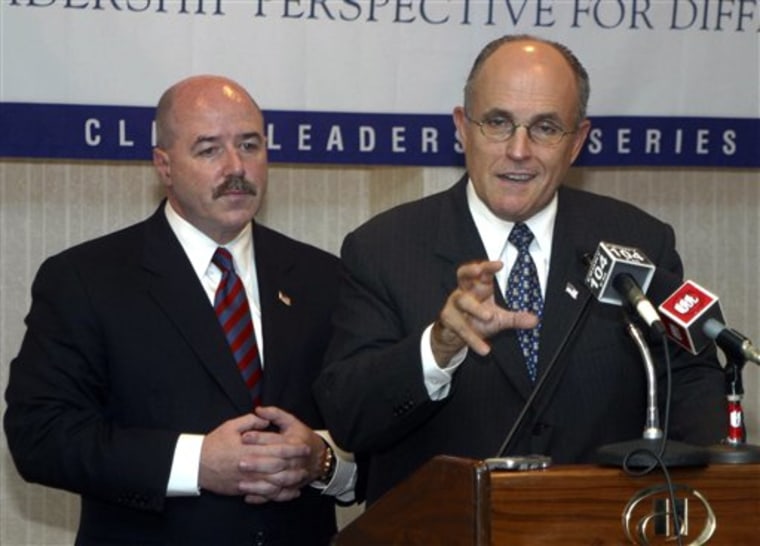Plenty of people - politicians included - have skeletons in their closets. In the case of presidential candidate Rudy Giuliani, that closet is a walk-in.
The former Republican mayor of New York City won widespread praise for his handling of the Sept. 11 attacks, and it is largely that collective memory that accounts for his current popularity in polls and makes him the early front-runner for his party's nomination.
Yet as most New Yorkers could tell you, there are plenty of episodes in Giuliani's past that could come back to haunt him - scenes that played like a booming, angry opera.
"Rudy is a tough guy. Nobody has ever said he was Mr. Congeniality. It's not always pretty to look at, but he got the job done," said Rep. Peter King, R-N.Y., who backed Sen. John McCain in 2000 but now supports Giuliani.
Silence is golden
So far, most of the major players in Giuliani's past public sagas have stayed silent, and that silence may be worth far more to him than any endorsement.
Skeleton No. 1 is his last police commissioner, Bernard Kerik, once nominated by President Bush to head the Homeland Security Department. Kerik's close association with Giuliani became radioactive when Kerik pleaded guilty last June to a misdemeanor of accepting a gift from a company seeking city work.
Kerik acknowledged accepting $165,000 in renovations on his Bronx apartment from a company attempting to land city contracts. But he never explicitly admitted that his efforts on behalf of the company were tied to the work on his home.
Kerik is still under investigation, and any further criminal matter surrounding him will only draw more attention to the relationship with the former mayor.
Skeleton No. 2 is Giuliani's first police commissioner, William Bratton, now the police chief in Los Angeles. Working for Giuliani, Bratton began the police reforms in New York that led to historic crime reductions and helped turn tawdry Times Square into a Disney-certified tourist destination.
Bratton's forced departure from New York in 1996 began a debate that goes on even now: Does the credit Giuliani that claims for the crime reduction really belong to Bratton?
Skeleton No. 3 is Giuliani's first wife, Regina Peruggi. They married in 1968; Giuliani had the marriage annulled in 1982, on the grounds they were second cousins once removed.
Skeleton No. 4 is Donna Hanover, his second wife. Their painfully public separation at the end of Giuliani's time as mayor seriously damaged his image, but has become overshadowed by his performance in the last months of 2001.
Each of the four, through their aides, declined to comment.
Additional concerns
In an age when every politician's life is put under the microscope and analyzed, cracks have already appeared in the candidate's public veneer.
Giuliani's son, a college student, recently acknowledged that he is essentially estranged from his father and has "a little problem" with his father's current wife - his stepmother. Judith Giuliani also revealed that contrary to years of published reports, Giuliani is her third, not her second husband.
After his son spoke out, Giuliani asked that his family be allowed to resolve its issues in private. Some of his boosters insist such matters will not become a serious problem.
"It's going to have a minimal impact, because there's no smoking gun, so to speak," said King. "They are trying to make it work. It's not ideal, but I think a lot of people will sympathize."
Diplomacy and Giuliani
The Rev. Al Sharpton - a civil rights activist, former presidential candidate, and longtime Giuliani foe - said he does not think his fellow Democrats will attack Giuliani's personal foibles, but fellow Republicans might.
"I'm not one that ever got into his personal life, but clearly I think that when you run for president it would be examined," said Sharpton. "Especially since the Republicans raised it so much with Bill Clinton."
Sharpton cringed at the notion of Giuliani-style diplomacy.
"His view was, 'I'm in charge and no one gets the spotlight but me,' and he had polarized the city to such a degree that he was a lame-duck mayor," said Sharpton. "This is not the kind of guy that can go to the United Nations and negotiate. He is a very inflexible guy in terms of how he deals with opposition and how he deals with people."
Giuliani's prickly past may not make for inspiring chapters in a political biography, but maybe they should, argued Henry Stern, a former parks commissioner under Giuliani.
"He's not like other people. He says things they wouldn't say, he does things they wouldn't do," said Stern. "I think it's a sharper, New York edge that he has to him, and it reflects his background."
As much as his pugnacious persona may be better suited to the sidestreets of Brooklyn than a political podium, Giuliani, in fact, both plays up and mocks his New York roots, entertaining crowds with impersonations of old-fashioned New York mobsters.
Stern said his former boss's tendency to take no prisoners and suffer no fools reminds him of another New Yorker running for the White House: Hillary Rodham Clinton.
"Both Rudy and Hillary are not apologists or apologizers," Stern said, "and I think ultimately that comes out as a strength."
